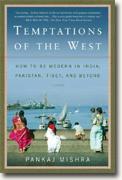Temptations of the West
Pankaj Mishra
book reviews:
· general fiction
· chick lit/romance
· sci-fi/fantasy
· graphic novels
· nonfiction
· audio books
· author interviews
· children's books @
curledupkids.com
· DVD reviews @
curledupdvd.com
newsletter
win books
buy online
links
home
for authors
& publishers
for reviewers

 |
Temptations of the West: How to Be Modern in India, Pakistan, Tibet, and Beyond Pankaj Mishra Picador Paperback 336 pages June 2007 |
|
This book was not what I imagined it would be. I had expected an analysis of the lifestyles of young computer geeks who are climbing up out of the eternal abyss of Asian fatalism, zealous for a piece of the capitalist pie. This is not that kind of book. This is a book about politics more than lifestyle. Not that there’s anything wrong with that.
At a time when India is pushing hard to modernize partly through outsourced American technological jobs, Mishra reminds us that this push has been going on since before Independence. India always had an articulate upper class that longed to embrace the best of British and to eschew and somehow subdue the “obstinate” poverty of its vast majority. In his long segment about Allahabad, Mishra traces the family fortunes and missteps of the Nehru/Gandhi clan, whose powerful grip on India shaped, to a large extent, the sometimes corrupt, often slapdash manner in which the country approached assimilation into the family of nations. India is arguably a post-modern culture, having enjoyed the heyday of the maharajas and of monarchy long before the incursion of democracy. It takes democracy seriously, though to an outside, Western observer, its exercise of multi-party government is chaotic and ultimately depressing. Politicians still think they can promise the populace anything in exchange for their votes, and that failure to deliver will go unnoticed. And they are, Mishra seems to be saying, largely correct. As observed by Mishra, a candidate rides hastily through a village where there is an electric line but no current, and where the government appointed schoolteacher appears when he likes and on his infrequent stops steals the rice meant for his pupils. The bigwig swears that a new tube well will be dug and power will be cut on as soon as the election is over, well knowing that if nothing happens, no one will complain or that if someone does, there will be no one to hear. One frank but disturbing figure whom Mishra encounters is Hindu nationalist Uma Barti, who rode a wave of respectful admiration into the political arena by dint of her apparently sincere immersion in Hindu holy scripture, then turned away from the piety that had galvanized her followers, admitting baldly that religion was, for her, merely a means to power. Barti seems to typify the schizoid mind of progressive India. For culture in the post-Raj, India has Bollywood, where rising starlet Mallika proclaims her interest in serious art offscreen yet is still avidly determined to be a sexual object onscreen. There are attempts to make meaningful films in Bollywood, and Mishra cites and admires them, though he, like most people, finds Indian films vapid and overblown even when they tackle political issues. With television more of a factor in the ratings, Indian filmmakers no longer have to please the poor any more than do the politicians but can cater instead to the burgeoning technocrats in urban areas who enjoy repressed sensuality (two flowers touching is the standard way of signifying torrid intercourse), sprays of bullets, and just a touch of realism thrown in. Mishra visits Afghanistan, Nepal, Pakistan and Tibet and sheds light on the complex and often scurrilous connection he perceives between Hindu nationalism and American politics. Nowhere are Mishra’s biases more clearly underscored, so read with your eyes wide open: “In the angry editorials in London, the Taliban…appeared as particularly vicious barbarians from the Middle Ages instead of the bastard children they increasingly seemed to me of the West’s arrogant meddling in Afghanistan in very recent times.” Originally published on Curled Up With A Good Book at www.curledup.com. © Barbara Bamberger Scott, 2007 |
|
|
|
 Click here to learn more about this month's sponsor! |
|
| fiction · sf/f · comic books · nonfiction · audio newsletter · free book contest · buy books online review index · links · · authors & publishers reviewers |
|
| site by ELBO Computing Resources, Inc. | |
 Pankaj Mishra, a Hindu Indian now living in the West, is a man with facts pouring from his fingertips and a real desire to reach an audience which some have critically defined as “white pro-Muslims.” In this curiously constructed “travelogue,” he weaves together the history of various Asian sub-continental regions with their current political and cultural conflicts and paradoxes. Lots of the latter.
Pankaj Mishra, a Hindu Indian now living in the West, is a man with facts pouring from his fingertips and a real desire to reach an audience which some have critically defined as “white pro-Muslims.” In this curiously constructed “travelogue,” he weaves together the history of various Asian sub-continental regions with their current political and cultural conflicts and paradoxes. Lots of the latter.